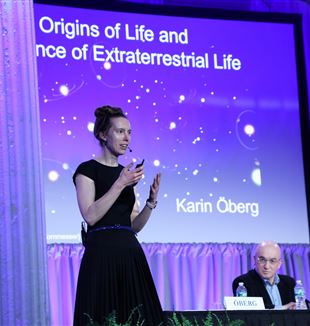
Saturday at the New York Encounter: Freedom and Mission
A panel on "the human pursuit of business," an evening with poet Paul Mariani, and Archbishop Christophe Pierre and Julián Carrón among others on Saturday at the New York Encounter.Where can one start in pursuit of meaningful work that brings fulfillment? The first presentation on the Saturday of New York Encounter titled “Human Pursuit of Business” addressed this very question, closely following the 2019 theme “Something to Start From.” It is tempting to reduce working to being a cog in a machine, a mere responsibility or a necessary evil, but Father Luigi Giussani always talked about work in a refreshing way, as a need of the human heart capable of showing man himself. “We’re helping people make connections within themselves and with others,” said William Linton, founder and CEO of Promega Corporation, further stating employees find the fact that his business respects their humanity attractive. Linton highlighted the value in a business for long-term business practices rather than immediate gratification, treating employees with dignity and freedom, charitable work and involvement in the community. It was clear in how the panelist spoke and manage their businesses that, paraphrasing moderator Anujeet Sareen, portfolio manager at Brandywine Global, neither has smothered his real expectation in front of a lie. “There’s a difference between what’s practical and what’s real,” said Sareen. “You see that.”
The events of the day continued with a panel called “An Epidemic of Loneliness,” which examined this new breed of loneliness has been creeping into our culture as meaningful relationships decrease. Dr. Kerry Cronin, a professor of philosophy and associate director of the Lonergan Institute at Boston College, and Emily Esfahani Smith, author, noticed this increase in loneliness through their fields and relationships. Cronin said a conversation about dating she had with her students years ago led to her create an extra credit assignment in which students had to ask someone on a date. “[Students] don’t know how to make real connections,” said Cronin. “What I see ... is a grinding, low-level despair” coupled with an insatiable desire for connection with another person. Cronin also mused about the possible correlation between the decline in religious adherence and the increase in depression and anxiety among the youth. Moderator Marcie Stokman, founder of Well-Read Mom, asked the panel what possibilities can fill this despair, this distance between people. Smith initially responded with her experience growing up in a highly spiritual Sufi community and then later moving away. “Without this constant striving around me, I began to wonder whether it is possible to have a meaningful life without religion, spirituality,” said Smith. There is an incessant search and need for happiness in our culture, but Smith noticed the chase for happiness leads to despair if it has no roots. “What fills the existential void is meaning,” she said. “The central source of meaning is the fact of belonging to communities and other people. The risk of a community is that you’re exposed, you make yourself emotionally vulnerable.” Belonging is what makes relationships worthwhile, said Cronin. “Belonging is really about loving that piece of the divine in the other.” She also spoke about how belonging is not just a feature of a relationship but is a choice. “We need to practice this social courage — courage for connection,” she said. Quoting Aristotle, she said others are worth risking on because we are guided by courage to know what is worth fearing and what is worth following.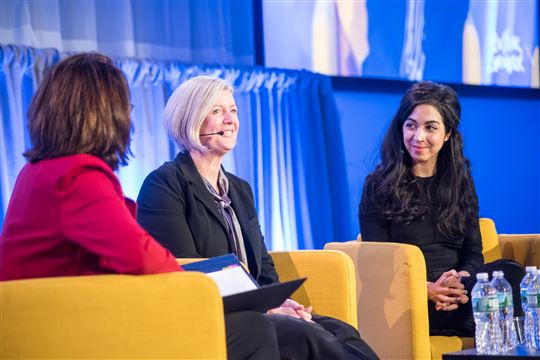
A panel of three high-school students introduced the exhibit “From My Life to Yours” on the origins of the Movement in GS. “All that is present here at the New York Encounter is rooted in this man, Luigi Giussani,” said Amy Sapenoff, moderator for the panel. The purpose of the exhibit, said Sapenoff, is to show that “here . . . Giussani is still helping young people to discover their hearts.” The students specifically spoke about their experiences that have emerged from the GS vacation, School of Community and friendship. “This is the greatest expression of the friendship that we share because of this common desire,” said Paolo, a 12th grader from Maryland, of the GS vacation. Using this realization as a starting point for a journey, Paolo has come to see clearly that there is something greater than himself. “When I encountered Christ, I discovered my humanity.” Sofia, a 12th grader from Miami, was raised in a devoutly Catholic family, but she said she and religion didn’t work out — until she met GS in high school and started attending School of Community. “That first meeting changed my life,” said Sofia. She has discovered through the friendships and guidance of GS that she belongs somewhere, and Christ is at the center of that belonging. “School of Community is the route to my heart.” For Maddie, an 11th grader from Minnesota, the friendship of Father Giussani through belonging to GS continues to teach her the value of her being. “GS began not as a club or an organization but because of a human friendship and an interest within a person,” said Maddie. She also said she has begun to love herself and others because of the gaze of complete affection she has received — because of the way Another has looked at her in the eyes of the people around her. “I begin to look at myself with a tenderness and a love because I’m seeing what I’m made of and who I’m made for,” she said. “I have this certainty that I’m made for something so great.”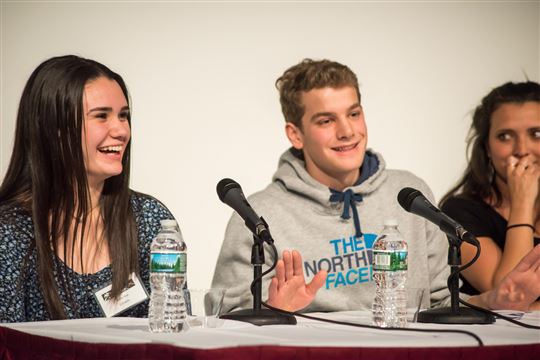
This same look of tenderness toward another was discussed by the panel “Do not be afraid to set your sights higher” in reference to Pope Francis. In an age often characterized by divisions and rising secularization, Pope Francis invites the Church to provide a place for the people who need to encounter Jesus. But who is this man the Holy Spirit has given us to lead the Church? “When you meet him, what strikes you is his astonishing graciousness,” said Austen Ivereigh, a British journalist and author of a biography on the life and papacy of Pope Francis. “His humility is striking; his task is to create space for the Spirit to act . . . he produces an enormous sense of freedom in you.” Apostolic Nuncio to the United States Archbishop Christophe Pierre highlighted that the 2007 meeting of the South American bishops at Aparecida, Brazil, revealed a new way of judging modernity. Then-Archbishop Jorge Bergoglio (Pope Francis) was at the forefront of leading the bishops in discerning what the Holy Spirit was asking of the Church in that moment of history instead of lamenting what has been lost in modernity. For the Church to become missionary for the sake of the world and not for the sake of her own self-preservation is Pope Francis’ dream, said Archbishop Pierre. Father Julián Carrón, president of Communion and Liberation, elucidated that Pope Francis sees the Church’s problem with modernity is really a question of freedom. “This crisis is a possibility to understand Christianity,” said Carrón. “An institution cannot answer this challenge . . . the only possibility to answer this situation is to announce the Christian event as it was announced for the first time.” That is, meeting someone today who deals with reality and its difficulties in an attractive way. “Christianity can only be conveyed by attraction,” said Carrón. “The pope is the giant the Lord has given us to reawaken the joy of Christianity.”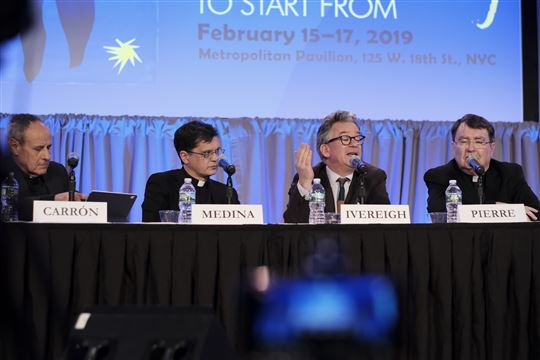
In the panel “Character: Something to start from?” speakers dialogued about the nature and value of character in American society — and whether it can be a true starting point. Quoting educator Charlotte Mason, Anne Snyder, director of Character Initiative at the Philanthropy Roundtable, said: “The question is not how much does the youth know when he has finished his education, but how much does he care?” Snyder pointed out that in the contemporary context the buckling of institutions and rise of individualism, one is lead to ask if “character” is relevant to the modern person anymore. She found in her work and personal experience that the root of character is knowing one is loved. “Family is the first and primary educator, and school should support it,” said Jackie Aldrette, managing director for AVSI-USA. Aldrette used the AVIS-affiliated Luigi Giussani school in Uganda is an example of a place where children receive holistic, character-forming education. She said that ass educators and parents, they are less interested in building character traits and more interested in building up persons. “[There is an] importance in education of looking at our desires and facing setbacks,” said Aldrette. To approach reality in this way Aldrette said there must be order and beauty, authority, freedom, critical thinking, family and community. She sees the Luigi Giussani school’s educative method working in the lives of its teachers as well as students, noting how it continues to positively change their relationships at school and at home.
Searching for this deeper meaning, for what lay beyond, is at the heart of scientific research. Reality attracts man to science, feeding his desire to go further, affirming that something calls to us. Jonathan Lunine, director of the Cornell Center for Astrophysics and Planetary Science, posed preliminary questions to the audience during the “Beyond the Moon…to the Farthest Reaches” panel: “One of the most profound questions we can ask as human beings is: In what way are we special? Are we alone in the cosmos?” Lunine explained the difficulty for medieval astronomers in detecting planets because of the glare of their parent stars — but eventually from their observations was born exoplanets, the study of planets around other stars, a new and popular segment of astronomy. Lunine further stated that all we know about stars and distant planets depends on our confidence that “our universe is a creation of an omnipotent God that made for us a place that is regular and predictable and which we can, therefore, study,” and that the universe in its regularity was indeed created to be studied as a gift. Karin Öberg, professor of astronomy at Harvard University, works specifically with the origins of life and the probability of extraterrestrial life. Öberg elaborated on the history of man’s fascination with the sky beginning in cosmology — from believing it to be the home of the gods to a map illuminated by the stars — and argued that this fascination must have challenged how early Christians looked at God. “The cosmos was incredibly well ordered,” said Öberg, “an icon of the ordering within the Creator himself.” But what to exoplanets tell us about God? “This is [a] God [who] enjoys a variety of creative things,” said Öberg. And as for the possibility of extraterrestrial life and its relationship with humanity, Öberg said: “God has always worked through a small group of people to save the rest; maybe that’s what will happen with ETs.”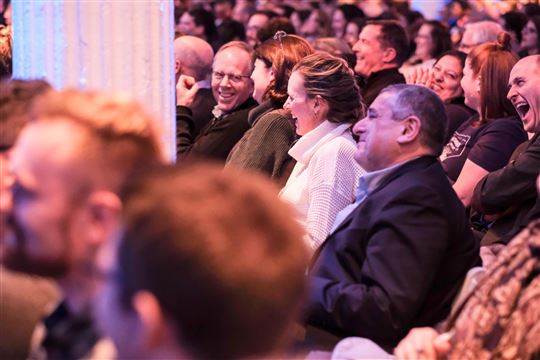
The Albacete Forum sponsored an exhibit presentation on Walker Percy’s autobiographical novel Lost in the Cosmos, which delved into Percy’s vision of life. This vision centers around the unidentifiable strangeness of the human being, which Percy expressed in the book: “of all the billions and billions of strange objects in the Cosmos . . . you are beyond doubt the strangest.” Percy’s unwillingness to give a flat answer to the question, “Who am I?” demonstrated his persistent wonder in front of the irreducible strangeness of life and the exhibit itself provoked its visitors to ask for themselves what they are seeking in this life.
All who attended the panel “An Irreducible Expectation” were, as moderator John Zucchi put it, let into the kitchen of the lives of its panelists: David Brooks, a New York Times columnist, and Father Javier Prades, president of the University of San Damaso in Madrid. Brooks, by now a friend of the New York Encounter made evident by the applause and his familiar way of speaking, began with a series of self-deprecating jokes, ironically commenting on the cerebral culture to which he belongs. However, Brooks insisted the cerebral rationalist within us is not the deepest part. “The deepest, most important part of us is the desire of the heart,” he said. He likened our desires to bamboo: it will still shoot up sprouts even after layers of pesticide, excavation and concrete. The heart yearns for fusion with another person. The second, deeper part of us is the soul, said Brooks, that which gives us infinite dignity. Both our desires and our soul point to an ultimate end, a calling, in which freedom must be wielded and attach to something outside of ourselves. “We live in a society that conspires against joy, that offers a false freedom,” said Brooks. “The young do not crave infinite possibility but some good and meaningful thing to which to devote themselves.” This creates the solitude and individualism of which he spoke, even on a personal level. Brooks spoke of his life falling apart as he was consumed by work: in his house "where there should have been silverware, there were sticky notes; where there should have been plates, there were envelopes . . . It was a life of desiring the wrong things: reputation, and time over people. “Freedom sucks, when it is unattached.”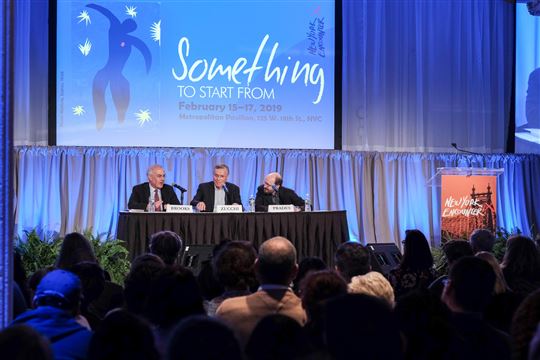
At this point, Prades described the landscape of uncertainty found in modernity. He stressed a response must come through a lived experience, a “recognition in action,” and it is the responsibility of the Church to present the truth within the “narrative of a lived tradition.” “The role of religion,” said Prades, “is not to win ethical debates but to provide places for construction of the person.” In the end he expressed in a moving and personal way his gratitude for the network of friendships he has, which is the reason he was at NYE and which lead him to desire Christ and further to desire that Christ be known by the whole world. Prades expressed gratitude for his experience of an "irreducible expectation" that happened when he was 14 years old and still happens now, which came about in an encounter with something "bigger than New York.”
Poetry is an expression of this something deeper to start from that puts us in access to the deepest longings of our heart. Poet Paul Mariani, as a true poet, read aloud a selection of poems — poems that instill hope — with a depth of emotion that even brought him to tears during the presentation “Poetry: Longing of the Heart”. His depth of feeling is what is required in order to give form and words to the deepest human experiences. Poetry’s gift is that it requires that you feel experiences deeply. Brooks spoke of the need of being broken open in order to be brought to the depths of our need and vulnerability. This recognition of our need often only comes in moments of suffering. The poetry presentation offered poems that give flesh to these decisive human moments and offer the possibility of recognizing and adhering to something even deeper: something that remains.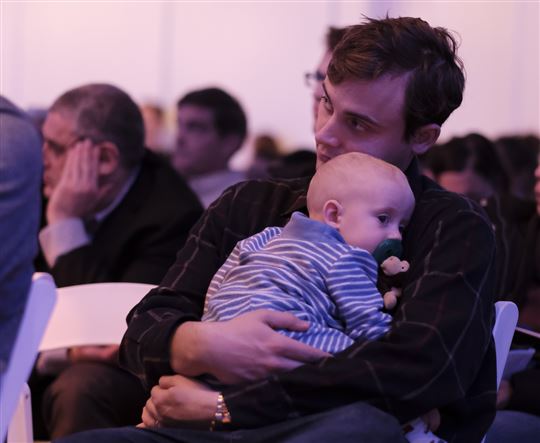
In a presentation titled after the words of the great John Lennon, “When I cannot sing my heart, I can only speak my mind,” writer John Waters explored the option of rock and roll as a place of departure for encountering the infinite. “When I was young, the most powerful sense of wonder was inspired in me by music,” said Waters. In his personal experience with rock music, Waters cited Elvis as someone who for him embodied the brilliance of something extraordinary. He noted that good rock music does not over-emphasize the self but taps into something transcendent — both in the sense of nostalgia and toward the infinite. Rock has the capacity to communicate the human experience when ordinary words fail, and, rather than being a source of escapism, rock educates the listener to confront the chaos of real life. Even though rock and roll has its corruptions, which Waters cited as “nihilism, narcissism, hedonism,” it remains the antidote to the chaos of our times by at the same time speaking of transcendence. Waters closed with an example: a video of David Bowie kneeling and praying the Our Father during a concert in tribute to all those dying of AIDS.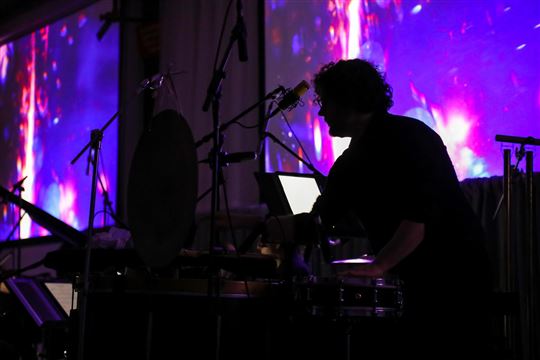
The evening concluded with a performance entitled “Island of Peoples,” a multimedia concert based on stories of immigrants coming to the United States through Ellis Island. Ellis Island opened in 1892 and was one of the first federal immigration stations in the US, operating until 1954. In 1990 a museum was developed on the island to tell the story of the immigrants who passed through its port. Diana Pardue, director of the Museum Services Division at the Statue of Liberty National Monument and Ellis Island, said the museum has developed an oral history collection of immigrants, which currently holds over 2,000 interviews in the public domain. In a pre-performance presentation, Gabriele Vanoni, the creator of the “Island of Peoples” project, said his personal interest in Ellis Island emanated from his great-grandparents’ immigration to the United States from Italy. “I have all this desire to meet these people because they shared their stories with me,” said Vanoni. “This is why we came up with the title ‘Island of Peoples’.” The performance depicted the often chaotic and dire circumstances that people fled from and faced in immigrating to the United States — while simultaneously communicating the search for home, desire for community and the persistence of memory as loci of the common human experience.